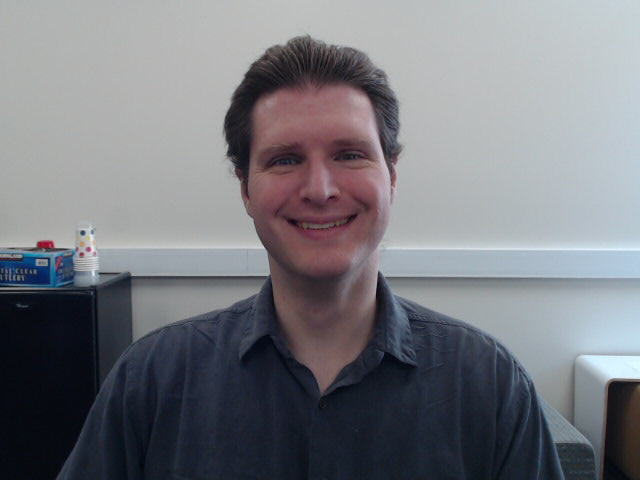Welcome to CS 111!
- Press O or Escape for overview mode.
- Press the copy icon on the upper right of code blocks to copy the code
What we'll discuss today...
- Introductions
- What is CS?
- About the course
Introductions
Instructor: Section 1
 Michael Clark: Brother Clark dropped out of High School to
pursue higher education and earned a BSc in Computer Science from BYU in
2005. He then earned a MSc in Information Systems and Operations Management
from the Hong Kong University of Science and Technology in 2006 before
leaving to serve a mission in Atlanta, GA en español. When he returned, he
worked at HIT Webdesign, with Zagg's website team, at InsideSales.com, at
Jolt (then called Intuiplan), and at various companies under the umbrella
of Hall Labs. Deciding he finally had enough real-world work experience to
be a great professor, he returned to BYU to study Usable Security and is a
current PhD candidate.
Michael Clark: Brother Clark dropped out of High School to
pursue higher education and earned a BSc in Computer Science from BYU in
2005. He then earned a MSc in Information Systems and Operations Management
from the Hong Kong University of Science and Technology in 2006 before
leaving to serve a mission in Atlanta, GA en español. When he returned, he
worked at HIT Webdesign, with Zagg's website team, at InsideSales.com, at
Jolt (then called Intuiplan), and at various companies under the umbrella
of Hall Labs. Deciding he finally had enough real-world work experience to
be a great professor, he returned to BYU to study Usable Security and is a
current PhD candidate.
TAs
We have an awesome group of TAs 😎. See the course website for information about them.
A Very Brief Introduction to Computer Science
What is Computer Science?
About this course
Course Origin
We have borrowed and adapted this course from UC Berkeley's CS61A course --- with their permission and help
Big thanks to UC Berkeley and their CS61A staff!
Course topics
- Managing complexity in programs (procedural abstractions, data abstractions, programming paradigms)
-
 Deep understanding of programming concepts (using Python)
Deep understanding of programming concepts (using Python)
- How computers interpret computer programs
- Different types of languages (Regex, BNF, Scheme)
- Problem solving techniques (both iterative and recursive approaches)
This course is challenging and often mind-blowing! 🤯
Course prerequisites
This is not an introductory programming class.
You should have prior coding experience with branching, loops, and functions.
If you do not think you have enough programming experience, consider taking CS 110 and joining us next term.
Course format
Course components
- Lectures
- Labs
- Discussions
- Homeworks
- Projects
- Exams 😱
- Textbook (composingprograms.com)
- Office hours
Everything is linked from https://cs111.byu.edu
Weekly schedule
| Monday | Tuesday | Wednesday | Thursday | Friday | |
|---|---|---|---|---|---|
| Lecture | Lecture | Lecture | |||
| Section: Lab/Discussion | Section: Lab/Discussion |
Labs & Discussions
Make sure you are signed up for a Lab section (002-004) as well as the lecture.
You'll have the same TAs for both lab and discussion. Community! ❤️
Homeworks & Projects
Homeworks due after one lecture and lab period, labs due the next day. Projects are typically due on Saturday night. Start early, code often!
Due to Spring term, we'll be moving fairly fast. The earlier you find you need help, the better!
You can discuss the assignments at a high-level, but don't copy anyone else's code (unless it's your project partner).
Exams 😱
- Midterm 1: Thursday, May 11
- Midterm 2: Thursday, June 1
- Final Exam: finals week (June 22-23)
UC Berkeley has all past exams available on the UCB CS61A resources page. Study early, study often!
All exams are scheduled to be held in the Testing Center.
Both midterms are open for two days, with the last day having a $5 late fee after 3:00pm.
Office hours
- Brother Clark: MWF after class or check TMCB 267 and we'll find somewhere to talk
The TAs are regularly available five days per week in the help lab at TMCB 1121. Check the schedule at cs111.byu.edu/staff/#ta-lab.
Getting help
Post questions on Discord. If you're debugging assignment code, follow the debugging template.
Check out our contact page for how to get in touch.
Course policies
Course policies
Read the syllabus. You are responsible for knowing the information there.
Learning
Community
Course Staff
Collaboration
Asking questions is highly encouraged
- Discuss everything with each other; learn from each other!
- Some projects can be completed with a partner
- Choose a partner from your discussion section
The limits of collaboration
-
Please don’t look at someone else's code!
Exceptions: lab, your project partner, or after you already solved the problem - Please don't tell other people the answers! You can point them to what is wrong and describe how to fix it, but don't tell them what to type, and don't type for them
- Copying project solutions causes people to fail the course
- We really do catch people who violate the rules, and we're getting better at it. (🫙🎵)
What's next?
- Thursday: Lab 00 to get your computer setup
- Thursday: Discussion 00
- 5-10 minute stretch break
- Lecture 2: Functions and Frames